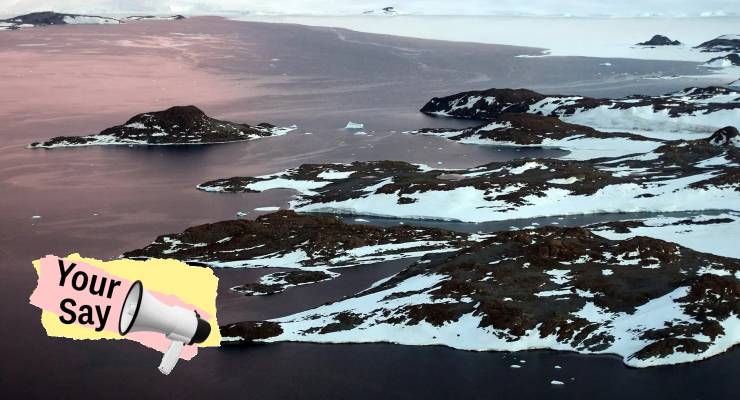
John Peel writes: While trying to calculate from Emma Elsworthy’s excellent article — “What Australia’s coastal residents are in for now Antarctica’s ice melt is inevitable” — how many generations it would be before my descendants would be drastically affected by climate change, I realised I was falling into a trap. I may never share a moment of my life with my great-grandchildren (I’m close to 81), much less their children, but the responsibility for any future catastrophe is entirely mine and I wish all our generation would own up to that.
What can we do? For starters, stop being so forgiving of leaders, even those as basically decent as federal Environment Minister Tanya Plibersek, who allow new mines and do nothing to limit or stop our export of lethal fossil fuels, and instead start making a bloody awful fuss at every opportunity — beginning at the ballot box.
To my mind, Opposition Leader Peter Dutton and his renewables-hating lot are completely beyond the pale. But he’s followed at a very short distance by the pathetically wet Albanese government: if the teals and other independents end up with the balance of power, that’s the least both major parties deserve and, for the moment, the best we can hope for.
John Sved writes: Which is easier? Stopping fossil-fuel projects before they get started or leaving it to some future government once the projects are under way and the dire consequences are even better understood than they are now.
You may think the first is easier. For the Albanese government, it’s the second.
Simon Mansfield writes: You ask does the Albanese government need a boot up to bum to take serious action on climate change? I would have thought it is the Australian people who need a boot up the bum to take climate change seriously.
Giving and receiving
Richard Creswick writes: Re “Anthony Pratt bought access to the top in the US. He does it here too”: some Voice No voters did so because they didn’t want one particular group of people having access to government that other groups didn’t. Too stupid to realise there are hundreds of lobbyists who already have voices to government, and in some cases a level of influence of which we mere mortals, and our Indigenous friends, can only dream.
Andrew Barnett writes: Like gambling, drugs and prostitution, people will use money to buy political influence. And like gambling, drugs and prostitution, if we restrict it too tightly with laws it will move underground.
Australia will be best served by a rigorous transparency requirement (in law and in public expectation) and a healthy free press. The law cannot preserve our democracy; only doing democracy can preserve it.
Bob White writes: That we still use the term “the will of the people” as if we are a true democracy seems to me to say: “Don’t worry if most of our politicians are corrupt and influenced unduly by the rich because we are in a democracy.” I don’t see anything “democratic” in our politicians regarding policy influence, especially in the past 12 months.
All voters are equal, but some (say 0.0004%) are considerably more equal than others (99.9996%). Is this reflecting the “will of the people”?
Graham McCorry writes: A simple solution: establish a central clearing house where any amount of donations can be made to a political party but the clearing house does not disclose from whom the donation came.
Feathers fly
Erik Kulakauskas writes: Bernard Keane’s article is an inciteful and unerringly accurate essay (“Qantas reveals five amazing facts you didn’t know about your flight!”). I will never fly with Qantas again. In the past I have made Qantas my first preference. Never again and I have plenty of travel left in my ageing bones and body.
The real tragedy of this sordid affair is that it is Qantas employees who will suffer and bear the consequences of dishonest and pathetic management. Alan Joyce’s replacement as CEO, Vanessa Hudson, gives no cause for hope for the future. Her experience and tutelage were under the insidious Joyce, so nothing will change.
Qantas used to be an illustrious Australian brand. It is now desperately damaged and it’s hard to see it recovering. Sadly, if it does, it will probably be through illogical and misplaced support from the government (aka the taxpayer).
The Price isn’t right
Neil Churches writes: Re Peter Dutton’s apparent desire to canonise Jacinta Nampijinpa Price (is there a saint of lies?) risks his back (“The referendum’s result holds up a mirror to Australia, and the reflection is ugly”). The irony of her being declared as prime ministerial material is twofold: first, surely she can’t be singled out for her race as that would be divisive; and second, there are many Coalition kingmakers only too happy to see Dutton’s brand of nastiness “assimilated”.
In heaven, all lies are whitewashed.








While sympathetic to feelings of despair and anger about the too slow progress towards net zero emissions, the enthusiasm of some about blocking new coal and gas projects in Australia is misplaced. That comment will anger many, I know.
New projects will emit Scope 1 and 2 emissions, yes. But it’s the Scope 3 emissions that opponents get exercised about. Scope 3 emissions being from burning the product overseas.
All coal and gas projects will become stranded assets when countries meet their emissions targets. Targets which are more or less agreed upon world wide. Even if not well implemented yet.
It’s odd that Australian opponents of Australian coal and gas projects think that overseas end users will stop emissions because we won’t approve coal and gas projects, despite those same users themselves having committed to reducing emissions.
That said, if the world did commit to no new coal and gas projects, that would be good but, they’ve already committed to emissions reductions!
Am I missing something? (A rhetorical question?)
Aah, the old drug dealers defense “If I don’t sell it, someone else will”.
But seriously, if you reduce supply (or at least not try to massively expand it) the price goes up in overseas markets, and people look for alternatives. Sure, there will be some substitute suppliers, but there will be also moves to RE.
Don’t believe me? Take western Europe fossil methane gas supplies after Nord Stream was first cut off then blown up. Prices skyrocketed. Some substitution happened from Norway and North America, however RE and storage projects greatly benefited as well.
Oh, and scope 1 + 2 emissions are not to be scoffed at. The largest user of domestic gas in Australia is the LNG export business. Building the Barossa gas field is expected to wipe out any CO2e savings from converting our transport fleet to electric.
Thanks Cej. I’ve heard the “drug dealers defence” argument used before. It does illustrate the problems with using an analogy and then arguing from the analogy rather than deal with the actual issue. But, to stick to the analogy; banning drugs hasn’t helped has it?
Elsewhere your observations are pretty much spot on. The sudden loss of Nord Stream did increase in prices, but prices have fallen back despite the initial loss of a huge amount of gas. There’s a lesson there.
In the longer term the demand for coal and gas depends on how much we’ve embraced emissions reductions. Net Zero means no more coal or gas.
Local Scope 1 and 2 emissions are our problem to solve by adherence to our targets.